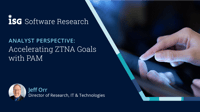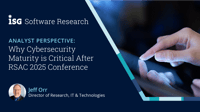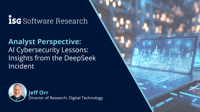About the Analyst

Jeff Orr
Jeff leads the firm’s overall research and advisory for CIO and technology leader practice focused on digital modernization and transformation for IT to be successful across an organization. Jeff’s coverage spans cloud computing, digital security, generative AI and technologies for intelligent automation. Jeff previously led Ventana Research’s products organization and market research that enables comprehensive educational insights for our community of over 100k professionals. Prior to joining Ventana Research, he served as editor in chief and thought leader for Cyber Security Hub. Jeff spent a decade as a Research Director at ABI Research, and two decades as a technology, product and marketing leader. Jeff attended Embry-Riddle Aeronautical University, UC Berkeley and UC Santa Cruz. He is also an Oregon State University Certified Master Gardener.
The shift toward a Zero Trust Network Access (ZTNA) framework is a strategic move for enterprises aiming for an enhanced security posture. ZTNA operates on the principle of "never trust, always verify," ensuring that every user and device is authenticated and authorized before accessing resources. In this context, Privileged Access Management (PAM) emerges as a critical enabler for an effective ZTNA implementation.
Read More
Topics:
Cybersecurity,
IT & Technologies,
Identity and Access Management,
PAM,
IAM,
ZTNA,
Privileged Access,
Zero Trust
The annual RSAC Conference took place in late April in San Francisco, where over 40,000 professionals from the cybersecurity industry converged at the Moscone Center to discuss the latest trends, products and services aimed at threat identification and organizational security.
Read More
Topics:
Cybersecurity,
GenAI,
IT & Technologies,
Agentic AI,
EDR,
XDR,
PAM,
SIEM,
IAM,
Quantum,
Threat Intelligence,
SOAR,
Data Recovery,
Data Resilience,
ZTNA
In an era defined by the relentless advance of cyber threats, enterprise security leaders grapple with an overwhelming landscape. Enterprises face complex challenges as sophisticated attacks and increasing responsibilities stretch security teams thin. Many describe daily experiences as perpetual "firefighting," trapped in cycles of reacting to incidents rather than developing proactive strategies to fortify defenses.
Read More
Topics:
Digital Technology,
Cybersecurity
In a defining moment for the artificial intelligence (AI) sector, the recent breach involving Chinese company Liang Wenfeng (makers of DeepSeek AI) has shed light on the emerging cyber threats that challenge the industry. The reported incident revealed that DeepSeek AI had left its ClickHouse database accessible to the public, exposing over one million lines of log entry data. This data included chat histories, secret keys and other sensitive information. Further complicating matters, Microsoft...
Read More
Topics:
Digital Technology,
Cybersecurity,
Generative AI,
DeepSeek,
OpenAI
Conversational automation leverages artificial intelligence (AI)-powered agents, chatbots and virtual assistants to automate both customer interactions and internal processes. These systems understand natural language, sentiment and intent, generating relevant responses and executing actions based on user input. The software provider landscape is analyzed in the ISG Buyers Guide for Conversational Automation.
Read More
Topics:
Self-service,
natural language processing,
Chatbots,
Customer Experience Management,
Intelligent Automation,
Conversational Automation,
IT & Technologies
As quantum computing advances at an unprecedented pace, the concept of Q-Day—a day when quantum computers can fundamentally undermine our current encryption methods—has entered discussions among cybersecurity professionals and business leaders alike. While there is no definitive date set for Q-Day, we are approaching a critical juncture where traditional cryptographic techniques may no longer suffice to protect sensitive data, digital communications and transactions. This impending shift not...
Read More
Topics:
Digital Technology,
Cybersecurity,
Digital Security,
Q-Day,
Quantum Computing,
Cryptography
The evolution from basic task automation platforms to advanced task orchestration and management marks a milestone in the journey toward Intelligent Automation. Task automation platforms initially enabled enterprises to automate repetitive tasks, freeing valuable human resources for more strategic activities. However, as the need for seamless coordination of multiple automated tasks becomes increasingly apparent, enterprises are transitioning toward orchestration approaches that enhance...
Read More
Topics:
Digital Technology,
RPA,
Generative AI,
Intelligent Automation,
Orchestration,
Bot
The structures that govern enterprise security teams are under scrutiny. A recent report from a government watchdog group has taken issue with Microsoft’s cybersecurity strategies in the wake of its Exchange Server attacks, prompting the enterprise software giant to re-evaluate its reporting structures. The implications of this shift extend beyond Microsoft itself, with cybersecurity becoming a leading challenge for companies from every industry as cyber and ransomware attacks have grown in...
Read More
Topics:
Digital Technology,
Cybersecurity,
Digital Security,
CISO
Generative AI (GenAI) software can transform various aspects of enterprise operations, which makes it a critical component of modern business strategies. GenAI tools can automate repetitive tasks such as data entry, report generation and customer interactions. GenAI can improve overall operational efficiency, resulting in time and cost savings for the organization. Another benefit from GenAI software is the ability to analyze vast amounts of data and extract actionable insights, enhancing...
Read More
Topics:
Playbook,
Digital Technology,
employee experience,
Customer Experience Management,
Intelligent Self-Service,
Generative AI,
Intelligent Automation,
Promptbook
The latest ISG Buyers Guide for Cloud Computing Platforms uncovers the market evolution of regional and global cloud providers. Buyers Guides for Public Cloud Platforms, Private Cloud Platforms and Hybrid Cloud Platforms are part of the recent software provider evaluations. ISG Software Research defines Cloud Platforms as a software service for organizations to access virtualized IT resources via the internet on a pay-per-use basis. These resources include servers, data processing power, data...
Read More
Topics:
Cloud Computing,
Digital Technology,
natural language processing,
Multi-Cloud,
ITOps,
Accessibility,
Sovereign Cloud,
Orchestration,
Hybrid Cloud





















